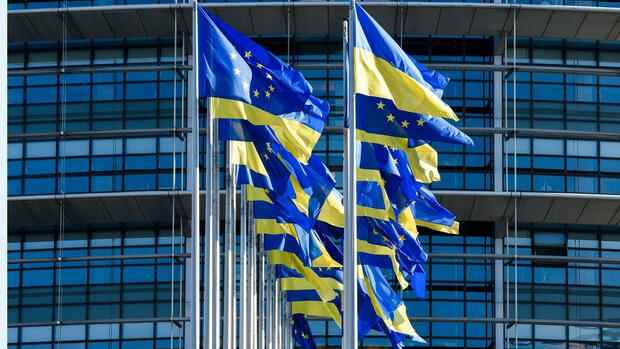If you want to become a member of the EU, you have to meet many, many criteria.
(Photo: dpa)
The EU Commission is currently examining the membership application from Kyiv quickly and benevolently. Presumably next month she will make a recommendation to grant candidate status to Ukraine. Everything in record time: it normally takes a country more than a year to complete the application; and it usually takes the Commission more than a year to examine it. The fact that everything is happening so quickly now shows that a lot is at stake.
Nevertheless, there is a risk of a blockade by the decisive EU body: the Council. Member States must decide unanimously whether to follow the Commission’s recommendation. Many want it: especially the countries of Eastern Europe. But neither are many: Western Europeans – some of whom are generally skeptical about enlargement – who are correspondingly sour about the Commission’s ambitious approach.
They give several reasons for their veto: Whoever wants to become a member of the EU has to meet many, many criteria. Ukraine does not fulfill this, especially not since Russia has been in the process of reducing the country to rubble and ashes. “Can we negotiate accession with a country that is at war? I don’t think so,” said French President Emmanuel Macron at a recent meeting of heads of state.
Of course he’s right about that. However, there are many, many stages between EU membership and candidate status. Just because a country is a candidate country does not mean that accession negotiations will start soon, much less that it will become a member any time soon.
Top jobs of the day
Find the best jobs now and
be notified by email.
But it means that a country belongs to the political community of Europe and potentially also to the group of EU countries. This is a statement that is of great importance for Ukraine, but also for international politics. In the end, Russia is waging its war of aggression, which is contrary to international law, mainly because the country is oriented towards the West, i.e. towards Europe.
The EU integration of the Western Balkans must also move forward
In addition, the EU has greater influence on the development of a country if it is considered a candidate for accession and is therefore obliged to adapt legally and structurally to the association of states.
There is another counter-argument put forward by Western European countries: what about the Western Balkan countries, long in the queue for EU membership? A yes from Brussels to Ukraine could snub them.
In fact, the Western Balkans’ non-advancement EU integration is a prime example of the failure of the EU as a geostrategic actor. In 2003 – almost twenty years ago – the post-Yugoslavian states were given the prospect of future EU membership. Little has happened so far. Example North Macedonia: Thirteen years ago, the EU Commission recommended starting accession talks with the country for the first time. But first Greece blocked the beginning for years, then France, now Bulgaria. In each case for domestic political reasons. A European geostrategy looks different.
Meanwhile, China, Russia, the Gulf States and Turkey are using the elapsed time strategically to expand their influence in the region and to destabilize it. Politicians, diplomats and EU officials in Brussels have been warning of this for years and are finally calling for decisive steps in EU expansion.
Just as is the case with decisive steps: it takes the crisis. It’s been there since the war in Ukraine. Now the European capitals must act instead of making excuses.
Because if enlargement policy is also to be geopolitical, the EU can no longer act as hesitantly as before. She needs to stop blocking herself.
More: EU accession in an urgent procedure? The most important answers to Ukraine’s membership application.
